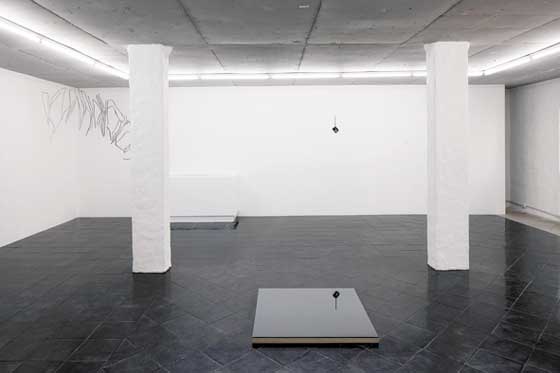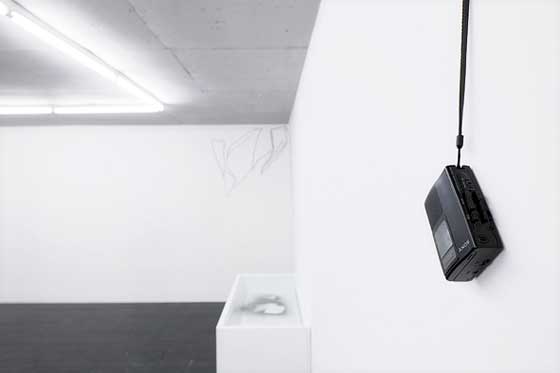|
|
| ...and without friends as well? Jānis Borgs, Art Critic Diffuse observations at Kaspars Groševs’ exhibition Kaspars Groševs. I/O. Without Enemies 15.05.–19.06.2011. Contemporary Art Centre kim? | |
| Each time I cautiously, but with a certain cat-like curiosity, head in the direction of the contemporary art hive kim?, I am initially overcome by an ever obtrusive similarity. The once powerful North Korean ruler, Leader Kim Il Sung comes to mind. See how Latvian it is – kim ir sens...! [Translator’s note: in Latvian this is play on words meaning approximately Kim is ancient…!] That particular Kim lived a really long time ago, but Rīga’s kim? is in no way ancient... The swarming of our kimian art sensei is largely conceptual, and ranges along the “gentle variation” zone of art philosophy. It doesn’t particularly challenge viewers with sharp visual excitement, but is always able to provide some food for thought and ideas with which it attempts to replenish our brain cells. Here, it seems, when creating exhibitions something has also been borrowed from the Great Leader’s Juche ideology: small budget events really do conform to the North Korean principles of independence and self-reliance. I think this has been confirmed yet again by another kim? event. In his I/O. Without Enemies exhibition, promising multimedia intellectual Kaspars Groševs makes us seriously reflect, and to contemplate again, that we’re not dealing with some sort of jokes about other races here. | |
 Kaspars Groševs. View from the exhibition 'I/O. Without Enemies'. In the foreground: 'Notes on the Space'. Object. 2011 | |
| As is generally accepted in conceptual exhibitions such as this, in his exposition there really isn’t anything to look at. And people who have been raised in the kinderstube of verbalism probably wouldn’t even have anything to find here, as the rules of the game dictate that kim? is a place for deeper thinking and meditation. The Great Spatial Emptiness organized by Kaspars Groševs is filled with light visual “knicknacks” ...barely noticeable stereo pins; some vigorous strokes on the wall, like in Japanese calligraphy; sundry playback equipment... Everything so very pizzicato... Kaspars Groševs has gained prominence locally as an avant-garde sound artist, a field where much is directed to heightening the expressive libido, at times almost to a psychedelic level and orgasmic eruption. There is the presence of sound in this exhibition as well, though nowhere near as radical, and the author has reduced it down to “room level” or “background atmosphere”. This is another reason why the exhibition induces a great feeling of uncertainty, like being in an aerodium. However, considerable assistance for seeing the light in the great “mists of incomprehension” is helpfully supplied by Groševs’ captivating explanations for the “Captivating Things”. Here’s some of them: Even though I don’t know how to swim, occasionally I will stand in the sea at a sensible depth and look in one direction or the other. When you find out something new, you can never really understand whether it had been known previously. It can so happen that it’s harder to forget the shadows than to remember the material or the colour. In the same way, it can happen that it’s more pleasurable to remember what was previously unknown. When, in his teenage years, artist and cultural theorist Brendon LaBelle wrote a letter to writer William Burroughs, instead of a reply he received a postcard from Kansas with the one phrase: “Words are your enemy”... A reference like this, to the words of the great American beatnik classic of the mid last century William Burroughs, kindles very warm and brotherly emotions. Somehow, a spiritual bridge between somewhat distant generations becomes established. Here one could even say – between the artist and the writer of these lines. And, the main thing, it provides the key to the code of Groševs’ entire exhibition, which, as the author hopes, is “without enemies”. Therefore – the exhibition is “without words”. Indeed, nothing of a narrative nature is being conveyed here, one must feel and enjoy the flow of moods in their weightless state of uncertainty. But for an instant there is a small flash of surprise about Groševs’ creative scope: from the elitism as expressed in this exhibition, right up to the “chattiness” of comics, where also the artist has been able to present his contribution as a dexterous draughtsman. | |
 Kaspars Groševs. One Erased Memory. Installation. 2011 | |
| In the “tried-and-tested values” environment of culture, uncertainty could, perhaps, be perceived as a huge and even brazen lack of seriousness. Hence, in order to seek support for strengthening the weight and significance of this condition of uncertainty, I even examine scientific explanations. Here, it seems, it would not be out of place to recall the Uncertainty Principle, formulated by German physicist Werner Heisenberg in 1927: “This Law of Quantum Physics implies that it is impossible to simultaneously precisely measure both a particle’s location and the speed of its momentum or impulse. The more precisely the position is measured, the less precisely one can determine its parameters of motion, and the reverse. Quantum physics explains this phenomenon in that by measuring one parameter, we unavoidably influence the particle and change its other parameters.” And, as if to provide evidence of the power of this principle, in the epitaph of the Nobel Prize laureate and co-creator of the Nazi atom bomb that never eventuated it is, apparently, written: “He lies somewhere around here”. Uncertainty is both serious and quite fundamental to our existence, as well as a “fun” activity. In his day, the classic of classics of all time Shakespeare vacillated: “to be or not to be...”, but nowadays Swiss advertisers have managed to interpret this as “too beer or not too beer...”. Groševs’ exhibition in many ways “doesn’t speak” of the form of a vessel or a pretzel, but rather speaks of the emptiness within the dimensions of a vessel or the hole in the baranka, both of which are no less substantial non-“entities”. His uncertainty, seemingly declared in confusion, is familiar to almost everyone in their daily lives: ...in the morning I awake and contemplate – who is this sleeping woman next to me?...; ...I gaze in the mirror and don’t understand, where have I seen this character before?...; ...I ponder: where has all my pay disappeared again?... Truly, the entire world’s “constant values” turn out at every moment to be relative, frivolous, problematic, ambiguous... Perhaps that’s why Kaspars Groševs chooses another alternative and in his input / output (I/O) information technology sockets communicates nameless values. Thus in his own fashion he overcomes the gravitational force of habitual assumptions. And, having freed himself from enemies (words), he perhaps also loses his friends (words)? Maybe like this, but perhaps in some other way... ??? /Translator into English: Uldis Brūns/ | |
| go back | |







